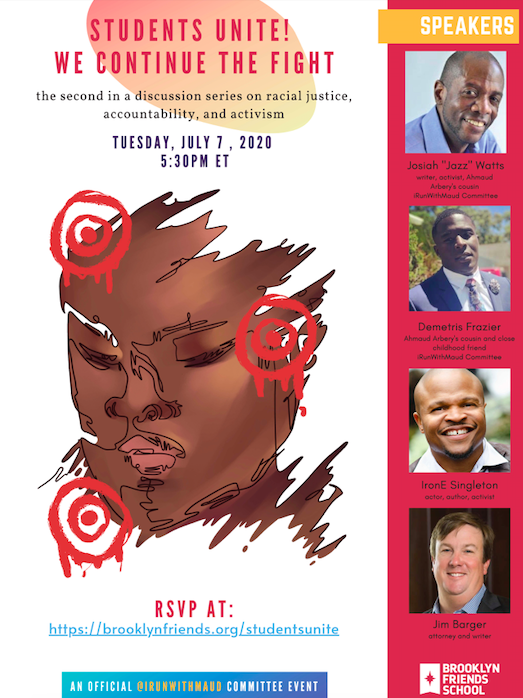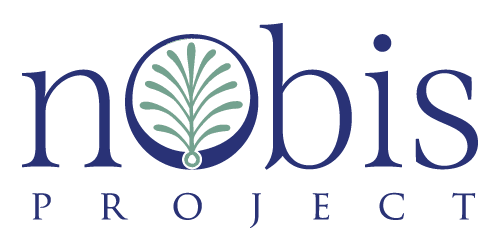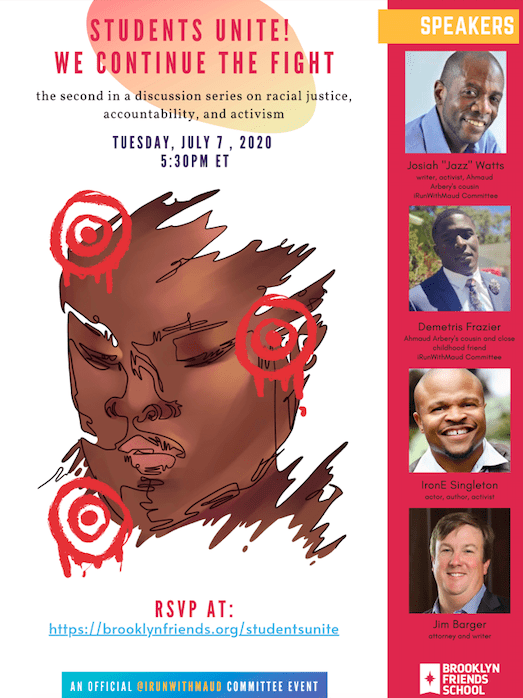By Emma Balsam, Nobis Project Intern –

Earlier this year, 11th grade students at Brooklyn Friends School (BFS) in Brooklyn, NY embarked on a Nobis Project field experience titled “Race, Power, and the Preservation of African-American History & Gullah-Geechee Culture” in Savannah and on Sapelo Island. Some of those same students embodied what it means to be leaders last month when they played a central role in the organization of a large, influential event in the memory of Ahmaud Arbery, a young Black man and Sapelo Island descendent who was tragically killed by three White men just two days after the 11th graders returned from their field study experience. The message of the event combined with the teamwork between educators and students allowed for this virtual event to be as successful as it was, with over 2,500 people from across the country registering to attend. The student learnings from this event are captured in this blog. My interview with the student leaders (read on for excerpts) highlights:
- the power and potential that young people have,
- the value of giving students the confidence to create or help facilitate conversations of racial injustice in their classrooms and beyond, and
- pointers for educators on how to inspire and support their students as they become active leaders in their school and/or community.
On February 23rd, 2020, an unarmed Black man was murdered while jogging in a neighborhood local to his home in Brunswick, GA. His name was Ahmaud Arbery and he was a son, a brother, a cousin, a friend, a teammate, and a person who had the rest of his life ahead of him. Ahmaud’s name is one of many on the long list of victims who have lost their lives due to racism in America. It is important to recognize that these victims are not just names, but that they were human beings with emotions, families, hopes, and dreams. Ahmaud’s loved ones and those close to him have signified that he will not be forgotten and that they will never stop fighting against racial injustice. Shortly after his death, the IRunWithMaud Committee was created with the mission of seeking justice for Ahmaud. A founding member of this committee is Josiah “Jazz” Watts, a Nobis Project facilitator and Ahmaud’s cousin.
BFS’s Office of Service Learning & Civic Engagement partnered with the founding members of the IRunWithMaud Committee to create a virtual event to speak about Ahmaud’s life, the latter’s experiences in the aftermath of Ahmaud’s murder, and what can come from this tragedy. BFS juniors and IRunWithMaud Student Interns Cyrah, Kayla, Loane, and Bebe served as moderators for the event, asking the guest speakers a series of questions and facilitating a dialogue rooted in honesty and respect for the viewers. Before the questions began, Kayla emphasized that it is important that people remember the humanity of the victims of police brutality and racial violence “before we talk about moving forward, before we talk about seeking justice, and before we share the resources about next steps.” She went on to conclude her introduction by stating that “it is important to honor who Ahmaud was and understand his humanity, so that we may better understand the humanity that lives within each of us.”
I contacted Natania Kremer, the Director of Service Learning and Civic Engagement at BFS, and was lucky enough to get the chance to interview Cyrah, Kayla, and Loane after the event via Zoom about their involvement, takeaways, and any messages that they had for the educators reading this blog. Excerpts from the interview are detailed below:
Emma: Why was it important, personally, for all of you to be involved in the making and organizing of this event?
Cyrah: I think for me, knowing that Ahmaud Arbery could be any one of us, being murdered like that, it was really important to step up and do anything because I just felt helpless at the time. Once Natania emailed me saying “This is an opportunity,” I was like there’s no way I can’t do this – I have to do this. We were here to just give our support in any way. We didn’t have a specific role that we wanted, it was more like whatever you need us to do, we’re here to do.
Kayla: I completely agree with Cyrah…Seeing the video of what happened to Ahmaud, then hearing about it, and learning about the circumstances, and being presented with the opportunity to engage and give support, it wasn’t something that I had to question…Personally for me, I don’t think I’ve seen an opportunity over the years for me to directly engage and support the people who are trying to do the work, specifically for the person who’s been harmed. When Natania shared that, I just wanted to help make progress and I saw it was possible in the ways that everyone was outraged and everyone saw what was going on. It wasn’t an option for me to sit by and watch it happen.
Loane: Oftentimes I’m involved in a lot of social justice conversations, but that’s really where it stays and we don’t really see a lot of results. I think that when Natania emailed us, I really saw this as an opportunity to actually make change.
Emma: Now that the event has passed, what are your takeaways as an organizer of this event? Where did you think the event was going to go before it happened versus now that it’s over?
Cyrah: I think we achieved our goal. I think that we can definitely say that because the main idea of the event was to humanize Ahmaud – that’s why a majority of it was just talking about his life and not really talking about his murder and the video… I also think the impact of it was honestly bigger than I expected. Even though, I think I can say for all of us, we didn’t really think we were leaders in this. We just really thought we were here to facilitate and shed light on what was going on, but it really impacted a lot. Our teachers are emailing, like congratulating us, and you all reached out to interview us, like we really didn’t think it was going to be this big thing.
Kayla: I didn’t think it would have been as big and have as many attendees as it did. I just thought that we were going to have a conservation within our school, and then whoever was willing to come and listen would show up. And then there were so many voices and so many people in the room – I was amazed by how many people wanted to hear from them… We got so many teachers telling us “you did amazing work” and “thank you for holding that space and doing the work” and I don’t think I expected people to say such nice things. I just thought that they would’ve come, listened, and that it would’ve come up a bit later, or they’d have taken the action opportunities and then went about it and then connected back. But to see that the conservation itself impacted people was really nice to see because it made it clear that we can use what we have in the midst of this pandemic, even when we can’t be physically together. I think that one of the most impactful things was connecting to Ahmaud’s humanity, for sure…
Loane: Yeah, I think they hit it, Cyrah and Kayla. Humanizing Ahmaud was one of the most beautiful takeaways from the event. There was a lot of love that you could see between the IRunWithMaud Committee and it was really nice to see them talk. They’re just a really nice group of people and having a discussion with them… I learned so much.
Emma: What advice do you have for students who might want to be organizers in their own community?
Cyrah: First step is, if you’re getting emails and you’re not the type to answer your email, look at your emails because I know there’s a lot of different events and things you can be a part of to help. Let’s say you’re by yourself and you’re like “I want to do this thing.” I think it’s important to plan. Gather people that you feel have the same interests that you have in doing this, and you can plan together and also reach out to a faculty member… You know, you have a voice within your school. And I think that’s important, like a lot of times we forget that we have voices in our school and it’s important to raise awareness of what you believe, even if you don’t have an action plan for it. Even just pointing out the injustice or something you want to work towards. Then adults and faculty can help you craft things…Listening, planning, and also researching what you’re passionate about is really important, as well.
Loane: I think also to be very intentional about the different aspects of what you’re planning, because when we were meeting in preparation for the event, some of the conversations we were having felt really tedious. We went really in depth to the implications of every little thing, but then I found later that it was actually really helpful and it added a lot of spirit and power to the event.
Kayla: If I had to give advice to student activists trying to plan something, I’d just say “do what’s in your heart.” Everything will fall into place after that. The logistics are important, like planning is important, connecting is really important, but make sure that the work that you’re doing is close to your heart because that’s the best way that you can do it.
Cyrah: Adding onto that, just one thing: start the conversation. I would say for students just wanting to talk about different issues or even be a student activist, start the conversation. And you don’t even have to have a goal within that conversation… Having those conversations is where it starts.
Loane: Be open to learning and growing. I already thought that I had a good understanding of social injustice and racism in America, but I’ve learned so, so much these last two weeks. To let yourself grow is really important.
Cyrah: I think listening and taking the opportunities to educate yourself is really important, and it can be a learning outcome. Even if you have no idea what you’re doing and you’re given a task, I would say “do it” and I’m sure you’re going to learn from it.
Emma: What message do you have for educators who want to start these conversations about social justice with their students? How can teachers inspire their students to want to get involved in making an impact like you guys have?
Kayla: I’d say be honest and leave room for honesty, because I think that sometimes in having these conversations we tend to sugarcoat it and make it sound a little sweeter than it actually is, just for us to sort of go around and then have to come back and to tell the honest truth that everything’s not alright… If you start off with what could be the hard truth, you will help the students in the long run when it comes to saying those difficult things and learning about those difficult things… Coming from a place of honesty, I was able to see, “okay, there’s work to do.” And I think that in sort of trying to make things comfortable, you delay the process of doing that work. I’d say don’t be afraid to be honest, offer support, and in doing those two things, you’ll get an amazing group of students who are willing to approach the situation and approach the space with their honesty, as well.
Cyrah: I think the most important thing that educators can do is create brave spaces. I think I learned that term like last year – that allowing students to be able to voice what’s going on and really show compassion and their humanity…being caring towards them, like showing that your voice matters. And you know, that even though we’re children, we can learn and we are capable of doing a lot of things that adults are doing now when it comes to activism. I think what educators need to know is… just to listen. Sometimes it’s really important to listen to what we are saying. And we might not have all the answers, we might not even be saying the right thing, but once you listen to us, there’s ways that you can help us and really just be open.
Loane: One thing that I really appreciate about the teachers at Brooklyn Friends is that I think they treat the students with so much respect and they really trust that we want to learn and that we are capable of learning and growing. I think to really respect and to not belittle students because they’re younger. And then also, leave space for vulnerability.
From my interview with Cyrah, Kayla, and Loane, I realized that once students are given the opportunity to share their voices and take hold of leadership positions, the possibilities truly are endless. Surprised at how massive of an impact the students had during the #IRunWithMaud event, Cyrah stated “With our platform now and showing our leadership, it’s important for us to continue doing work and taking opportunities because they know what we’re capable of.” This exemplifies that just one chance to engage in something meaningful can lead a student to realize the potential of their voice. From there, they might want to get involved with more experiences that allow them to both strengthen their leadership qualities and utilize their power to help make a difference in their environment and the world. To that end, included below are details about another upcoming event that these students are co-organizing in partnership with the IRunWithMaud Committee. Change starts with our youth, and nurturing, supportive educators have the power to nurture and inspire budding leaders for not just tomorrow’s society, but today’s.
Educators: tell us how you have or plan to help facilitate this type of motivation in your students.
~ ~ ~
Upcoming event being co-organized by BFS student leaders with the Office of Service Learning & Civic Engagement and the iRunWithMaud Committee: https://brooklynfriends.org/studentsunite/
Spread the word about this event to your school communities on Facebook and Instagram!



0 Comments